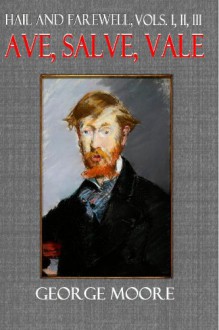Hail and Farewell, Volumes I, II, and III: Ave, Salve, Vale. 794 pages. * * * * * Practically all the things that have been said about George Moore and his books are true, though they are as diverse as the things written and said of Shelley. Indeed, it is difficult to be in...
show more
Hail and Farewell, Volumes I, II, and III: Ave, Salve, Vale. 794 pages. * * * * * Practically all the things that have been said about George Moore and his books are true, though they are as diverse as the things written and said of Shelley. Indeed, it is difficult to be in error about Moore, although it is vastly more difficult to be wholly right. The reason is, that the man is made of paradoxes; he is essentially Protean; as one reads "Ave," "Salve," and "Vale," one feels continually that one has mounted the peak of discovery, only to turn the page and find antithesis and disillusionment. It is as though Moore's mind and character were existing in a state of flux, as though change were the law of his being, with no point of rest where one may pause and cry, Behold the man. The modern reader is accustomed to consider with interest ideas and opinions utterly at war with established codes, and to demand only that the apostle of revolution be sincere. In the present world of chaotic ideas, this is the point of rest from which the general mind may not be dislodged. Moore says of himself, as Shelley's friends have said of him, that it is impossible for him to do or say anything of which his conscience does not approve; yet one feels that the author of "Salve" and "Vale" must somehow have confused himself with the Universal Mind in order to harmonize, even to himself, things so diverse as he has shown us existing side by side in his character. Perhaps he does not wish us to know him; perhaps he is playing with us subtly, perplexing us for his pleasure; or it may be that this story of his life is primarily a work of art, conceived according to principles of art rather than of truth. The incidental pictures of the great French artists of the period, Degas, Manet, Renoir, whom he knew well, are interesting, but their colors had been less obscured by a purer setting. Moreover, if we must, as it seems, consider these books as creations of art rather than the authentic record of a life, why should the staler wine be saved for the last of the feast? Doubtless the anti-climax has a definite purpose, for Mr. Moore does nothing that is not deliberate; but the reason is another of the perplexities with which he loves to vex us. The secret of Moore's disappointment in his Irish experience is, perhaps, the key to many of the perplexities about him. He is essentially an intellectualist. His native element is a world of ideas and emotions that are tangent to the social order but not of it. Within this realm of Platonic ideas, of emanations, of pale and graceful shades, he is vastly interesting; but when he attempts to emerge and act in the world of men according to the bloodless laws of his sphere, he is all but a comic figure. His ideas of conduct and art alike belong to the half light of "A Midsummer Night's Dream," yet he hoped to establish them in Dublin. In his disappointment, he says words which he knows will impose exile upon him, and at the close of "Vale" we are given the picture of his departure and return to the world of shadows, to spend what one feels must be a very lonely old age. The last pages contain tragedy and pathos; for Moore went to Ireland to champion a cause. Just what that cause may have been it is difficult to determine. It was, we may be sure, of the essence of his creed; but what that creed may be, and what the man himself really is, he has effectually kept us from knowing. One feels, after all, that he meant to keep the secret, for he is always subtle and always very intelligent. The result is a touch of comedy over the whole of the autobiography, which gives it its most enduring interest.
show less

